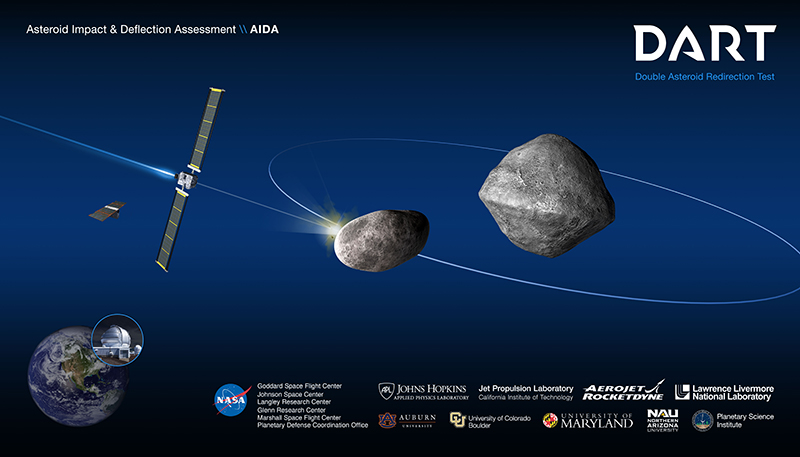Colby Cosh on NASA’s latest plan for “nudging” an asteroid out of its orbit:
NASA has a plan — a serious plan, which it intends to carry out pretty soon — to smash a spacecraft into an object in the solar system and intentionally change its orbit. I confess I don’t quite know why this act of awesome American techno-hubris hasn’t been bigger news. I think partly it is because the mission comes under the heading of “planetary defence” against small natural objects straying into the path of the Earth. Science reporters on that beat are easily distracted by apocalyptic fantasies, and by smirking anthropology about the actually-quite-numerous band of researchers trying to deal with this arguably-quite-important subject.
Part of the problem may be that NASA’s mission to mess with the asteroid Didymos B is hidden under a mountain of technical jargon about “kinetic impactors” and “xenon thrusters.” And part of it is surely the hard-earned professional knowledge that NASA ends up implementing about one plan for every 10 it makes. Accountants have a way of showing up with an axe at the last minute.
Still, the idea is pretty neat, and not just because it appeals to everyone’s natural appetite for destruction. The basic premise of the DART (Double Asteroid Redirection Test) is that our planet may one day face the asteroid/meteor/comet collision scenario outlined in a vast corpus of books and movies (Lucifer’s Hammer, Armageddon, Deep Impact). If that day comes, we as a species don’t want to just be winging it — so let’s go out now, find some innocent chunk of rock that isn’t bothering anybody, and see if we already have the technological capability to change its course.
This turns out not to necessarily involve Bruce Willis or Robert Duvall; mostly we just need Isaac Newton. The scheme of planetary defence now emerging from decades of speculation and effort emphasizes systematic tracking of near-Earth objects and early detection of potentially dangerous ones. If we can spot an approaching impactor soon enough, we don’t need to deliver a bundle of explosives: we can just nudge it out of the way.
Humanity has been pretty lucky that the asteroid impacts have been relatively rare since we started keeping track of important things like the planting calendar, the seasonal flooding of the rivers, and the ever-important (to the rulers) tax records. It wouldn’t take a particularly large object hurtling into the atmosphere at interplanetary speeds to ruin our collective day (year, decade, century, etc.). We think we know how to divert incoming dangerous objects … but we need to actually do it successfully before it becomes the last headline of all recorded history.




